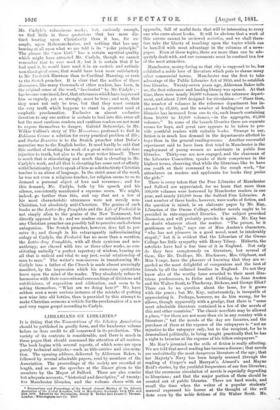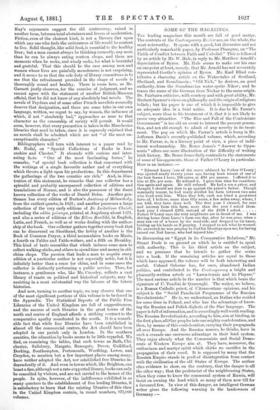LIBRARIANS ON LIBRARIES.* IT is fitting that the Transactions of
the Library Association should be published in goodly form, and the handsome volume before us does credit to all concerned in its production. The variety of its contents is considerable, and there is much in these pages that should command the attention of all readers. The book begins with several reports, of which some are upon purely technical subjects,—such as title-entries and size-nota- tion. The opening address, delivered by Alderman Baker, is followed by several admirable papers, read by members of the Association. The proceedings of the society are recorded at length, and so are the speeches at the dinner given to the members by the Mayor of Salford. There are also concise but adequate accounts, " historical and descriptive," of twenty- five Manchester libraries, and the volume closes with an
• Transactions and Proceedings of the Second Annual Meeting of the Libras* Association of the United Kingdom, held at Manchester, September 23rd. 24th. and 28th, 1879. Edited by the Secretaries, Henry E. Tedder and Ernest 0. Thomas. London : Whittingham and Co. 1380.
appendix, full of useful facts that will be interesting to every one who cares about books. It will be obvious that a work of this nature cannot be reviewed seriatim, and we shall there- fore take the liberty of touching upon the topics which can be handled with most advantage in the columns of a news- paper. Even of these topics, there are more than can be ade- quately dealt with, and our comments must be confined to a few of the most attractive.
Manchester, money-loving as that city is supposed to be, has exhibited a noble love of literature which puts to shame many other commercial towns. Manchester was the first to take advantage of the Public Libraries Act of 1850, and to establish free libraries. Twenty-seven years ago, Alderman Baker tells us, the first reference and lending library was opened. At that time, there were nearly 16,000 volumes in the reference depart- ment, and about 7,000 designed for circulation :—" Since then, the number of volumes in the reference department has in- creased to 61,000, and the number of lending2out or branch libraries has increased from one to six, each branch containing from 10,000 to 18,000 volumes,—in the aggregate, 85,306 volumes." In some of the branch libraries there are separate rooms for boys, and great care appears to be taken to pro- vide youthful readers with suitable books. Strange to say, fiction is in much less demand in the departments allotted to boys than in the general reading-rooms. Another successful experiment said to have been first tried in Manchester is the employment of young women as assistants in public free libraries. Thirty-one are now engaged, and the chairman of the Libraries Committee, speaks of their competence in the highest terms, observing that while the librarians like to have one youth at their command to do the rough work, "for attendance on readers and applicants for books they prefer the girls."
There is every token that the Free Libraries of Manchester and Salford are appreciated, for we learn that more than 500,000 volumes were borrowed by Manchester readers in one year, and nearly 243,000 from the Salford Free Libraries. A vast number of these books, however, were works of fiction, and the question is raised, in an elaborate paper by Mr. Kay, Librarian of the Owens College, whether novels ought to be provided in rate-supported libraries. The subject provoked discussion, and will probably provoke it again. Mr. Kay has no doubt whatever about the matter. "The person, be it gentleman or lady," says one of Miss Austen's characters, "who has not pleasure iu a good novel, must be intolerably stupid ;" but it is evident that the Librarian of the Owens College has little sympathy with Henry Utley. Hitherto, the uckelists have had a fine time of it in England. Not only do they fare sumptuously on literature, but several of them, like Mr. Trollope, Mr. Blackmore, Mrs. Oliphant, and Miss Yonge, have the pleasure of knowing that they are re- garded as the most delightful of companions and the best of friends by all the cultured families in England. Do not they know also of the worthy fame awarded to their most illus- trious predecessors, to Defoe and Fielding, to Jane Austen and Sir Walter Scott, to Thackeray, Dickens, and George Eliot? There can be no question about the fame, for it grows with the years ; but Mr. Kay, unfortunately, is incapable of appreciating it. Perhaps, however, we do him wrong, for he allows, though apparently with a grudge, that there is " some most admirable literature contained in a few of the novels of this and other countries." The classic novelists may be allowed a place, " for there are not more than six in any country with a literature ;" but the novels of the day are luxuries, and the purchase of them at the expense of the ratepayers is " not an injustice to the ratepayer only, but to the recipient, for he is demoralised politically, in being taught practically that he has a right to luxuries at the expense of his fellow-ratepayers."
Mr. Kay's jeremiad on the evils of fiction is really affecting. We are told that novel reading has become a disease ; that novels are undoubtedly the most dangerous literature of the age ; that her Majesty's Navy has been largely manned .through the reading of Cooper's and Marryat's, Aimard's and Mayne Reid's stories, by the youthful frequenters of our free libraries ; that the enormous circulation of novels is especially degrading to librarians ; and that the major portion of them should be scouted out of public libraries. These are hard words, and recall the time when the writer of a popular students' manual expressed his horror at the thought of the evil done even by the noble fictions of Sir Walter Scott. Mr.
Kay's arguments suggest the old controversy, raised in another form, between total abstainers and lovers of moderation.
Fiction, even of the choicest kind, is not a literary diet upon which any one who feels the seriousness of life would be content to live. Solid thought, like solid food, is essential to the healthy liver; but a man cannot always be thinking earnestly, any more than he can be always eating mutton chops, and there are moments when he seeks, and wisely seeks, for what is beautiful and grateful That this should be the case among men and women whose lives are painfully monotonous is not surprising, and it seems to us that the sole duty of library committees is to see that the refreshment provided in the shape of novels is thoroughly sound and healthy. There is room here, as Mr. Garnett justly observes, for the exercise of judgment, and we cannot agree with the statement of another British-Museum official, that he did not know of any absolutely bad novels. The novels of Feydeau and of some other French novelists assuredly deserve that designation, and there are some tales in our own language, written, we regret to say, by women, the influence of which, if not " absolutely bad," approaches as near to that character as the censorship of society will permit. It would seem, however, that every precaution is taken in the Manchester libraries that need be taken, since it is expressly enjoined that no novels shall be admitted which are not " of the most un- exceptionable character."
Bibliographers will turn with interest to a paper read by Mr. Nodal, on " Special Collections of Books in Lan- cashire and Chester." It abounds with curious and inter- esting facts. " One of the most fascinating forms," he remarks, "of special book collection is that concerned with the writings of a single favourite author and of everything which throws a light upon his productions. In this department the gatherings of the two counties are rich." And, in illus- tration of this statement, he remarks that one collector has a splendid and probably unsurpassed collection of editions and translations of Horace, and is also the possessor of the finest known collection of the works of Daniel Defoe. Another gen- tleman has every edition of Burton's Anatomy of Melancholy, from the earliest quarto, in 1621; and another possesses a large collection of the very early editions of Dc Lnitatione Christi, including the editio prineeps, printed at Augsburg about 1471, and also a series of editions of the Eikon Basilikg, in English, Latin, and French, as well as of works dealing with the author- ship of the book. One collector gathers together every book that can be discovered on Shorthand, the hobby of another is the Book of Common Prayer, a third accumulates books on Music, a fourth on Fables and Fable-writers, and a fifth on Heraldry. This kind of taste resembles that which induces some men to collect walking-sticks, and others to spend time and money in old- china shops. The passion that leads a man to acquire every edition of a particular author is not especially noble, but it is infinitely better than a craze for china, and in some cases the collector is distinctly performing a public service. Thus, for instance, a gentleman who, like Mr. Crossley, collects a vast library of tracts on political and historical subjects, may be assisting in a most substantial way the labours of the future historian.
And now, turning to another topic, we may observe that one of the most significant portions of this volume is to be found in the Appendix. The Statistical Reports of the Public Free Libraries of the United Kingdom are full of suggestiveness, and the success of such libraries in the great towns of the north and centre of England affords a striking contrast to the comparative apathy manifested in the south. It is a remark- able fact that while free libraries have been established in almost all the commercial centres, the Act should have been adopted in one parish only in London. In the southern counties, the education by books seems to be little regarded. We find, on examining the tables, that such towns as Bath, CM- chester, Salisbury, Margate, Ramsgate, Dover, Guildford, Dorking, Southampton, Portsmouth, Worthing, Lewes, and Croydon, to mention but a few important places among many, have neither adopted the Act, nor established free libraries in- dependently of it. And even in towns which, like Brighton, can boast a flue, although not a rate-supported library, books can only be consulted by visitors, and are not carried to the homes of the people. In spite, however, of the indifference exhibited in so many quarters to the establishment of free lending libraries, it is satisfactory to learn that the existing libraries of this class in the United Kingdom contain, in round numbers, 971,000 volumes.































 Previous page
Previous page